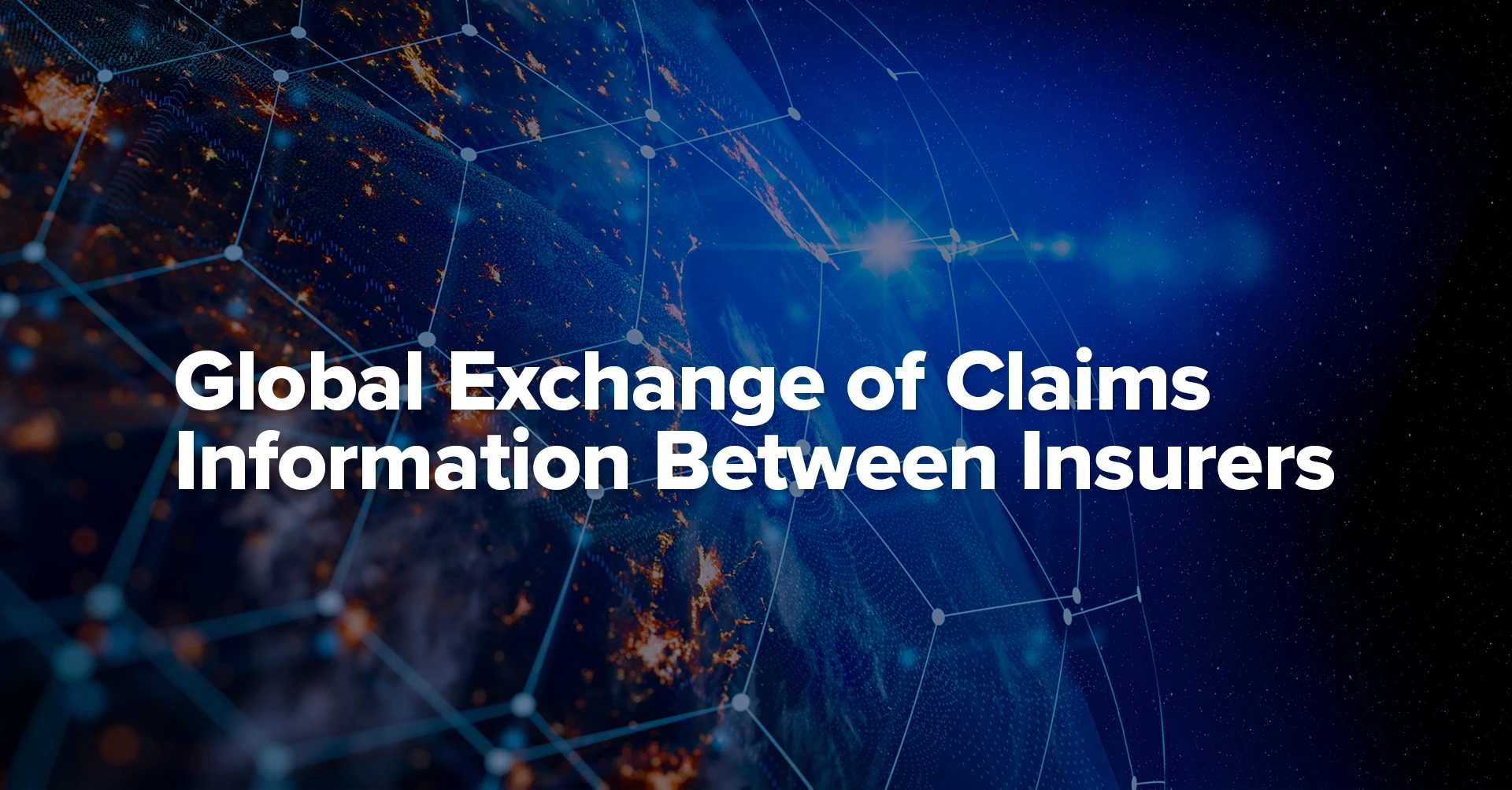Global Exchange of Claims Information
Aug 2, 2024
The exchange of claims information between insurers is essential for preventing fraud, managing risks, and ensuring fair claims processing. However, this process varies significantly across different regions and countries. In this blog, we will explore how claims information is exchanged in the US, Canada, Brazil, the UK, Germany, and the Netherlands. We will highlight key practices, technological innovations, and regulatory frameworks.
Key Reasons for Information Exchange
Fraud Detection
Sharing claims information helps insurers spot and prevent fraudulent activities by identifying suspicious patterns and anomalies in claims data.
Risk Management
Insurers can better assess and manage risks by accessing detailed claims histories. This leads to more accurate underwriting and pricing. It ensures that insurers can offer competitive and fair rates to their customers.
Regulatory Compliance
Information exchange ensures that insurers follow national and international data protection laws. It safeguards policyholders' privacy and adheres to compliance requirements. By meeting these standards, insurers can maintain their reputation and avoid legal penalties.
Data Protection and Regulatory Compliance
Each country has its regulatory framework for data protection. This influences how insurers can exchange claims information. Below are the regulations and practices in key countries.
United States

In the US, the exchange of claims information is governed by state regulations and the Health Insurance Portability and Accountability Act (HIPAA) for health-related claims. Insurers use the National Insurance Crime Bureau (NICB) and the Insurance Services Office (ISO) ClaimSearch database to share claims data for fraud detection and risk management.
These databases help keep sensitive data secure and ensure that personally identifiable information is handled according to strict security standards.
Canada
Canadian insurers follow the Personal Information Protection and Electronic Documents Act (PIPEDA), as well as provincial laws. The Insurance Bureau of Canada (IBC) operates a national claims database. This enables insurers to share information for fraud prevention and risk assessment.
Canadian insurers must ensure they meet compliance requirements to protect personally identifiable information and keep sensitive data secure. This helps them maintain trust with their policyholders and meet regulatory obligations.
Brazil
In Brazil, the exchange of claims information is regulated by the General Data Protection Law (LGPD). The Brazilian Insurance Confederation (CNseg) maintains a central database for claims information. This supports fraud detection and regulatory compliance.
Insurers in Brazil must follow strict security standards to protect personally identifiable information and maintain high levels of information security. This ensures the integrity of their data and compliance with national regulations.
United Kingdom

The UK uses the Claims and Underwriting Exchange (CUE) database, managed by the Motor Insurers' Bureau (MIB). This database contains information on motor, home, and personal injury claims. It aids in fraud detection and risk assessment.
The CUE data is crucial for identifying multiple claims and preventing fraud while maintaining compliance with GDPR. This system helps insurers streamline their claims processing and improve accuracy.
Germany
German insurers follow the General Data Protection Regulation (GDPR) and national laws for data sharing. The German insurance industry's notice and information system (HIS) serves to detect and prevent insurance fraud and abuse in the interests of insurance customers.
Policyholders must be informed about their data being stored and have the right to access this information. Insurers must adhere to strict internal control and data security measures to keep sensitive data secure. This ensures compliance and protects customer trust.
Switzerland

In Switzerland, the Claims Information System (CIS) is vital for the insurance industry, storing extensive claims data from participating insurers. This data is used strictly for application and claims processing, ensuring confidentiality and no third-party access.
Additionally, the Information and Reporting System (HIS) is in place to detect and prevent insurance fraud and abuse, protecting customers' interests. By using HIS, insurers can identify fraudulent activities, maintaining trust and transparency.
Switzerland's regulations ensure the secure, ethical use of claims information, benefiting insurers with reliable data and protecting policyholders by fostering a fair insurance market.
Austria
In Austria, the exchange of claims information is governed by GDPR as an EU member state. The Austrian Insurance Association (VVO) previously managed a central information system (CIS) where insurers reported claims and accessed detailed claims histories. This system is being replaced by a new GDPR-compliant system, ensuring efficient data exchange while maintaining high standards of data privacy and protection. This update enhances transparency and trust in the insurance sector, providing comprehensive claims data while fully complying with European data protection laws.
The Netherlands

In the Netherlands, insurers use several central databases, including the Foundation CIS for claims and a separate fraud database. These databases help insurers detect fraud and manage risks.
Information from these databases is used only for claims processing and not for other purposes. Dutch insurers must follow GDPR guidelines to protect personally identifiable information and ensure high levels of information security.
Belgium
National Claims Database
On the initiative of Assuralia's anti-fraud committee, the claims database was set up in 2021, which aims to combat (organised) fraud in motor insurance. This database is managed by the non-profit association Alfa Belgium.
RSR
The RSR file contains the special risks for BOAR insurance (Fire, Accident and All Risks, auto insurance included). The RSR file is an important element in the fight against insurance fraud.
Sweden/Norway
The general regulations of the GDPR also apply here. The insurance industry operates a central claims database in both Sweden and Norway. All insurance companies are connected to this and automatically report any damage. This central claim database contains information on the:
policyholder/claimant
line of business
date of loss
a reference number
insurance company that registered the claim
The prerequisite for the subsequent exchange of information between the insurance companies is the written consent of the person concerned.
In Sweden, in addition to the Central Damage Database, Lärmtjänst AB is of great importance. Larmtjänst AB is a non-profit organization which is part of the Swedish Insurance Association as an independent unit. Lärmtjänst works for insurance companies to reduce the abuse of insurance policies and support the investigative activities of insurance companies. Larmtjänst has built up an international network of contacts with law enforcement authorities, organizations and private companies over many years to support Swedish insurance companies in their international work.
Denmark
In principle, the exchange of information between insurance companies in Denmark is similar to Sweden. Denmark is also subject to the relevant provisions of the GDPR, however, there is no central claims database. Nevertheless, insurers can contact the Danish Insurance Association with their specific request for information in the event of special/suspicious claims. The association forwards these requests to all member companies, which contact the requesting company directly in the event of a hit. A corresponding consent form of the person concerned is also a prerequisite here. Similar to Lärmtjänst in Sweden, the Danish Insurance Association has a very good international network and therefore they are also in an excellent position to support Danish insurers in the event of claims abroad.
Iceland
The four Icelandic general (non-life) insurance companies are using a claims database for the Icelandic Financial Services Association (SFF) run by Creditinfo. The database will be used to counter organized insurance fraud, as it has been on the increase in relation to organized crime. Among the key things that can be seen in the claims base is whether the same damage has been paid out by more than one insurance company.
Information contained in the claims base is included in the updated policyholder’s terms. The claims base will record the claim reported to the insurance companies that are members of the Financial Services Association (SFF), with the exception of damages covered by life and health insurance. SFF is the operator and controller of the claims base, and Creditinfo has been hired to be the processor of the database with authority from the Data Protection Authority.
Technological Advances in Information Exchange Blockchain Technology
Blockchain technology offers a secure and transparent way to share data among insurers. By using a decentralized ledger, insurers can ensure that the data is tamper-proof and can be verified by all parties involved.
This can significantly reduce the risk of fraud and enhance trust in the system. It helps keep sensitive data secure.

Artificial Intelligence and Machine Learning
AI and machine learning algorithms can analyze vast amounts of claims data to identify suspicious patterns and potential fraud. These technologies help insurers detect anomalies and flag fraudulent claims in real-time.
This improves the efficiency of fraud detection and helps mitigate risks associated with fraudulent activities.
Secure Data Transfer Protocols
Using secure data transfer protocols, such as HTTPS and VPNs, can ensure that the data being shared between insurers is protected during transit. This reduces the risk of data breaches and unauthorized access. It keeps sensitive data secure and maintains high security standards.
These protocols are essential for maintaining information security and protecting personally identifiable information.
Benefits of Information Exchange
Enhanced Fraud Detection
By sharing claims data, insurers can identify suspicious patterns and prevent fraudulent claims. This safeguards their financial health and maintains market integrity.
The process is crucial for protecting personally identifiable information and keeping sensitive data secure.
Improved Risk Assessment
Access to detailed claims histories allows insurers to better evaluate risk. This leads to more accurate underwriting and pricing decisions. It improves business processes and helps insurance companies offer better services.
Enhanced risk assessment helps insurers remain competitive and responsive to their customers' needs.
Streamlined Claims Processing
Information exchange facilitates faster and more accurate claims handling. This improves operational efficiency and customer satisfaction. It can enhance business practices and improve the overall customer experience.
Streamlined processes reduce operational costs and improve service delivery. This benefits both insurers and policyholders.
Challenges and Considerations
Data Privacy
Ensuring compliance with GDPR, LGPD, HIPAA, PIPEDA, and other data protection laws is critical. Insurers must implement robust security measures to protect the data from unauthorized access and breaches.
This includes protecting personally identifiable information and keeping sensitive data secure.

Consent Management
Obtaining and managing consent from policyholders and claimants can be challenging. Insurers must ensure that they have clear and transparent consent management processes in place. They must adhere to compliance requirements and protect personally identifiable information.
Effective consent management builds trust and ensures legal compliance.
Data Accuracy
Maintaining accurate and up-to-date information in central databases is essential for effective information exchange. Regular data validation and cleansing processes are necessary to remove any errors or inconsistencies.
This helps keep business processes efficient and ensures that data is reliable. It supports effective decision-making.
Future Trends and Developments
Regulatory Developments
Ongoing regulatory developments will play a crucial role in shaping how insurers handle and share claims information. Regulators are likely to introduce new guidelines and standards to ensure that data sharing is conducted in a secure and compliant manner.
This will help protect EU citizens and other stakeholders.

Collaborative Efforts
Collaboration among insurers will be key to the future of information exchange. By working together, insurers can create a more resilient and efficient system that benefits all stakeholders.
This collaboration can extend to international partners. It will enable a global approach to fraud prevention and risk management.
Technological Innovations
The future of information exchange in the insurance industry looks promising, with advancements in technology and evolving regulations shaping the landscape. Insurers will continue to adopt innovative solutions to enhance data sharing, improve fraud detection, and streamline their operations.
Embracing new technologies will help insurers stay ahead of fraudsters and maintain high standards of information security.
Enhancing Insurance Operations Through Effective Information Exchange
The exchange of claims information between insurers is essential for fraud prevention, risk management, and regulatory compliance. While each country has its regulatory framework, the benefits of information exchange are clear.
By leveraging modern technologies and adhering to regulatory requirements, insurers can enhance their operations and provide better services to their customers. The future of information exchange in the insurance industry is bright, with ongoing advancements and collaborative efforts paving the way for a more secure and efficient system.

